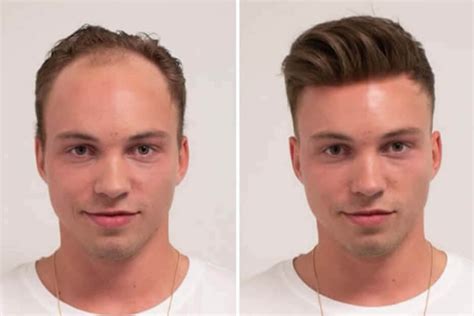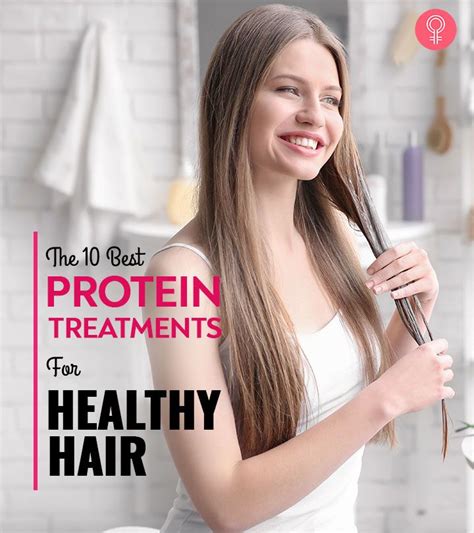Introduction
Healthy hair is essential for a confident and attractive appearance. However, environmental factors, styling practices, and aging can damage hair, leading to dryness, breakage, and a lackluster appearance. Protein treatments offer a solution to these problems by replenishing the hair’s essential amino acids, restoring its strength, elasticity, and shine.

What is a Protein Treatment?
A protein treatment is a hair care treatment that repairs and strengthens damaged hair by infusing it with proteins. Proteins are the building blocks of hair, and they play a crucial role in maintaining its structure and health. When hair is damaged, the protein structure is compromised, leading to weak, brittle, and porous hair. A protein treatment works by filling in these gaps in the hair’s protein structure, restoring its strength and resilience.
Benefits of Protein Treatments
Protein treatments offer numerous benefits for hair health, including:
- Increased strength and elasticity
- Reduced breakage and split ends
- Improved moisture retention
- Enhanced shine and vibrancy
- Smooth and manageable hair
- Protection from heat damage
- Reduced frizz and flyaways
Types of Protein Treatments
There are various types of protein treatments available, each with its unique set of properties and applications. The most common types include:
1. Keratin Treatment
Keratin is a natural protein found in hair, and keratin treatments aim to restore lost keratin levels. This type of treatment is particularly effective for damaged, dry, or chemically processed hair. Keratin treatments can smooth frizz, reduce breakage, and improve hair’s overall appearance.
2. Collagen Treatment
Collagen is another natural protein found in hair, and collagen treatments work by increasing hair’s elasticity and moisture retention. This type of treatment is suitable for all hair types, especially those that are dry, brittle, or prone to breakage. Collagen treatments can improve hair’s texture, reduce split ends, and add volume.
3. Hydrolyzed Protein Treatment
Hydrolyzed proteins are proteins that have been broken down into smaller pieces, making them easier for the hair to absorb. Hydrolyzed protein treatments are suitable for all hair types and can help to repair damage, strengthen hair, and improve its overall health.
4. Soy Protein Treatment
Soy protein is a plant-based protein that is rich in amino acids essential for hair health. Soy protein treatments are suitable for all hair types, especially those that are damaged, dry, or color-treated. Soy protein treatments can strengthen hair, improve moisture retention, and protect against heat damage.
5. Wheat Protein Treatment
Wheat protein is another plant-based protein that is beneficial for hair health. Wheat protein treatments are suitable for all hair types and can help to repair damage, strengthen hair, and add volume. Wheat protein treatments can also improve hair’s texture and reduce frizz.
6. Rice Protein Treatment
Rice protein is a plant-based protein that is rich in essential amino acids. Rice protein treatments are suitable for all hair types and can help to strengthen hair, improve moisture retention, and add shine. Rice protein treatments can also protect hair from heat damage and UV rays.
7. Pea Protein Treatment
Pea protein is a plant-based protein that is high in lysine, an amino acid essential for hair growth. Pea protein treatments are suitable for all hair types and can help to strengthen hair, improve its texture, and promote growth. Pea protein treatments can also reduce breakage and split ends.
8. Quinoa Protein Treatment
Quinoa protein is a plant-based protein that is rich in essential amino acids and minerals. Quinoa protein treatments are suitable for all hair types and can help to strengthen hair, improve its elasticity, and promote growth. Quinoa protein treatments can also protect hair from damage and environmental stressors.
9. Almond Protein Treatment
Almond protein is a plant-based protein that is rich in amino acids, vitamins, and minerals. Almond protein treatments are suitable for all hair types and can help to strengthen hair, improve its texture, and add shine. Almond protein treatments can also protect hair from heat damage and UV rays.
How to Choose the Right Protein Treatment for Your Hair
The best protein treatment for your hair will depend on your hair type and specific needs. Consider the following factors when choosing a protein treatment:
- Hair type: Dry, damaged, or chemically processed hair will benefit from stronger protein treatments, such as keratin or collagen treatments. Fine or oily hair may prefer lighter protein treatments, such as hydrolyzed protein or soy protein treatments.
- Hair concerns: If you are primarily concerned with repairing damage, strengthening hair, or improving shine, choose a protein treatment that is specifically designed for those purposes.
- Lifestyle: If you style your hair frequently or expose it to heat or UV rays, choose a protein treatment that offers protection against these stressors.
How to Apply a Protein Treatment
Protein treatments are typically applied to damp, clean hair. Follow these steps for optimal results:
- Shampoo your hair to remove any dirt or product buildup.
- Apply the protein treatment evenly to your hair, from the roots to the tips.
- Comb through your hair to distribute the treatment evenly.
- Cover your hair with a shower cap or plastic wrap and allow the treatment to sit for the recommended time.
- Rinse your hair thoroughly with lukewarm water.
- Style your hair as usual.
How Often Should You Get a Protein Treatment?
The frequency of protein treatments depends on your hair type and needs. As a general guideline, the following schedule is recommended:
- Healthy hair: Once every 4-6 weeks
- Damaged hair: Once every 2-4 weeks
- Chemically processed hair: Once every 1-2 weeks
Overdoing protein treatments can lead to protein overload, which can cause hair to become dry, brittle, and prone to breakage. Therefore, it is important to follow the recommended frequency and to listen to your hair. If your hair feels dry or brittle after a protein treatment, it may be time to reduce the frequency of treatments.
Common Mistakes to Avoid
When applying protein treatments, avoid the following common mistakes:
- Overusing protein treatments: Too many protein treatments can lead to protein overload.
- Using the wrong protein treatment: Choose a protein treatment that is specifically designed for your hair type and concerns.
- Not following the instructions: Read and follow the product instructions carefully to ensure optimal results.
- Leaving the treatment on for too long: Leaving the treatment on for longer than recommended can lead to protein overload.
- Not rinsing the treatment thoroughly: Make sure to rinse your hair thoroughly after applying the treatment to remove any excess product.
Conclusion
Protein treatments are a valuable tool for maintaining healthy, vibrant hair. By choosing the right protein treatment and applying it correctly, you can repair damage, strengthen your hair, and improve its overall appearance. Remember to follow the recommended frequency of treatments and to listen to your hair to avoid protein overload. With regular protein treatments, you can enjoy strong, shiny, and beautiful hair for years to come.
Additional Tips for Healthy Hair
In addition to protein treatments, there are several other tips you can follow to maintain healthy hair:
- Use a mild shampoo and conditioner: Avoid using harsh shampoos and conditioners that can strip your hair of its natural oils.
- Limit heat styling: Heat styling can damage your hair. If you must use heat, use a heat protectant spray to minimize damage.
- Get regular trims: Regular trims can remove split ends and prevent further breakage.
- Eat a healthy diet: A healthy diet provides your hair with the nutrients it needs to stay healthy.
- Manage stress: Stress can lead to hair loss and other hair problems. Find healthy ways to manage stress, such as exercise, yoga, or meditation.
